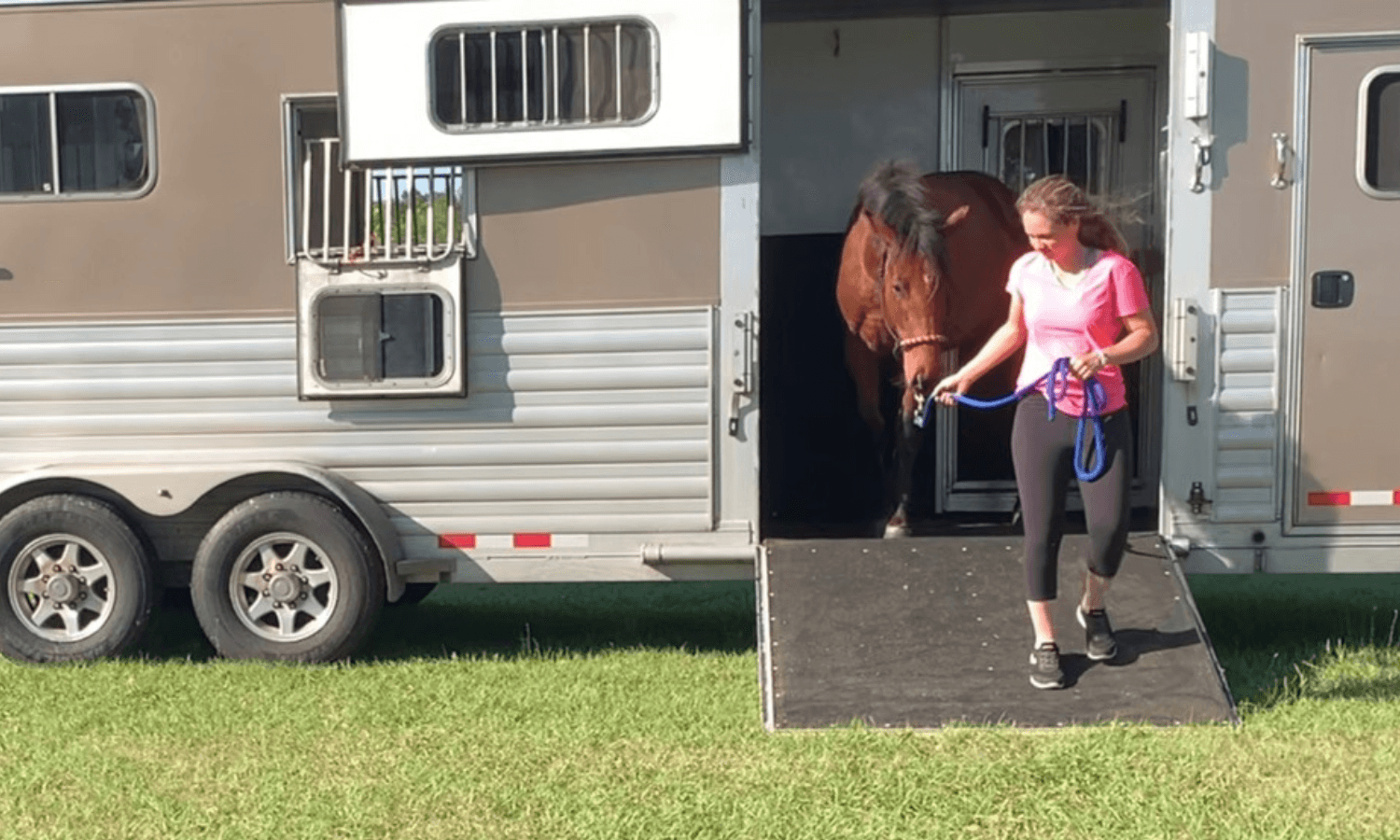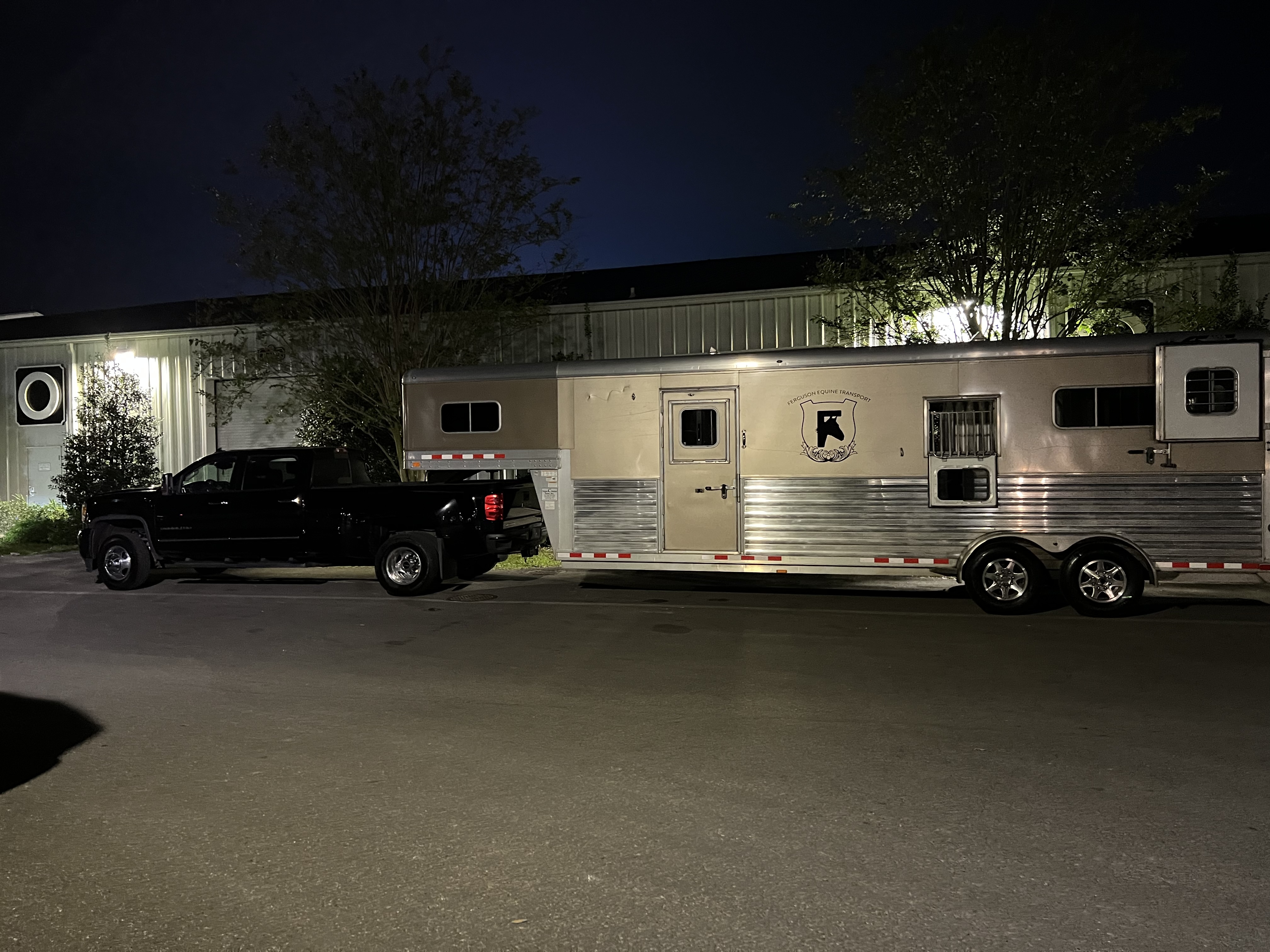Tips for the Long Haul: Advice from Shippers on Traveling for the Winter Season

It’s about that time of year again when eventers across the country are packing their trunks and making arrangements to new locations for the winter months. While some owners might feel more comfortable transporting their own horses, time and resources make it more expedient for others to load their horses onto someone else’s rig for the potentially long journey to their winter quarters. For the safety and peace of mind of everyone involved – especially the equine passengers – two trusted shippers based on the east coast shared their tips for best practices when preparing horses for long trailer rides.
Based at her Whistle Hill Farm in West Grove, PA, Laura DeFazio has been shipping horses around the country since 2015 and has gone as far as Texas, Idaho, and Illinois as well as hauling the well-worn routes from the Northeast to the Carolinas and Florida.

Her most important piece of advice for those looking to hire someone to transport their horses is to make sure that drivers are qualified for the job. While this might seem like common sense, the effort to find the most cost-efficient or convenient shipper sometimes steers people into risky situations.
“Make sure you get somebody that is experienced,” DeFazio advises. She notes that not all drivers working for large, commercial shippers are knowledgeable about horses as many companies hire truck drivers rather than horse people.
“I’m a horse person,” she says. “I ship with a vet box in the truck. In my vet box, I have sedations; I have Banamine IV; I have wraps. I have everything I would need [in an emergency situation]. If I have a horse that decides it’s not going to drink on the way, I’ll dose syringe it some Gatorade just to get something into it. I don’t expect horses to drink that much by the first stop, but if they don’t touch [their water bucket] by the second stop, I’m getting them a Gatorade.” DeFazio adds that she always checks with owners first before administering any supplement or drug on the road.
Besides having the necessary veterinary knowledge to handle basic medical issues and prevent larger problems from arising, a horse person like DeFazio is also attuned to the finer details of care, and that includes everything from making sure the right kind of hay or alfalfa is hung for the trip to ensuring that horses have Gastrogard or electrolytes as needed to planning a route that is the most stress-free and efficient experience for horses.
“If I’m doing a bunch of stops, I’m doing a bunch of stops that are going to the same area,” says DeFazio, who typically travels when and wherever she is needed. “If I was looking for somebody to ship my horse, I would want to make sure that my horse isn’t taking a tour of the east coast on its way to where it has to go. It stresses them out.”
DeFazio also cautions about the importance of legality and making sure that drivers are appropriately licensed and insured.
“Commercial shippers should have a Commercial Class A license to pull a combination over 26,001 pounds,” says Laura. “Commercial shippers have to have DOT and MC numbers and pay IFTA taxes, and they should carry insurance on your equines.”
All of these requirements are costs that shippers must pay to ensure safety and legality, and this cost is figured into the charge for customers. DeFazio emphasizes that drivers cannot be shipping for the cost of gas if everything is done appropriately.
Jackie Ferguson of Ferguson Equine Transport, LLC is another small, independent shipper who is widely used and trusted throughout the east coast. Based in Oak Ridge, New Jersey, and Ocala, Florida, Ferguson began shipping horses in 2017. At the time, she was grooming for a number of riders and trainers and witnessed some inappropriate behavior from commercial shippers.

“Some shippers would manhandle horses when they wouldn’t lead or weren’t accustomed to hauling frequently like a lot of our sale horses. They would take out the broom immediately. They wouldn’t even let the horse have a chance to look at the ramp and think about getting on the trailer. They wanted everything to happen super quick, and unfortunately, rushing isn’t always the answer with horses, especially when they’re already scared.”
Feeling that horses deserved more compassion and understanding in their travel experience and wanting also to provide a more reliable service to owners than what was available, Ferguson started her own business and now travels between Florida and New Jersey on a weekly basis.
Ferguson's first piece of advice regards travel attire:
“A lot of people will put boots or standing wraps on their horses to ship 18 hours and a lot of times, these horses are young or they haven’t shipped or they’ve possibly never even worn a boot before, so they just don’t like it. A lot of times, I’ll have to stop if they’re kicking the trailer. The wraps drop down below their coronary bands, which can create another type of disaster. Typically, I’ll redo them once and if they don’t behave afterward, I’ll go back there and pull the boots or wraps off. If your horse isn’t accustomed to wearing them, unfortunately putting them on a trailer with boots isn’t always the best idea. I would get them accustomed to what they need to wear for shipping prior to shipping. Put your horse in a stall a few times a week with some boots on so they can just get used to wearing them. I just wouldn’t suggest blindly putting them on for a trip for the first time.”
Ferguson also has some advice for feeding a horse before a long journey. “I personally don’t like when I show up at 4:00 a.m. or early in the morning to get a horse, and the customer gives them their full breakfast prior to loading. I don’t recommend feeding them a huge quantity. When a horse eats a whole grain meal right before they get on a trailer, a lot of times they get a little uncomfortable. They don’t necessarily colic but eating a whole bunch before you’re going to get on the road isn’t always the best idea. I recommend if they’re on a three-quart type program or something bigger than that, give them a quart with some water mixed in so it’s a soupy mash. At the layovers, a lot of people will send their horses with a lot of food. I tell them upfront I won’t feed it to them. I typically give them between a handful and a quart depending on how the horse shipped that day and what the horse’s body condition looks like. I do always mix it with water. Some horses, if they don’t drink on the trailer, I will mix it with electrolytes, which I disclose to the owners prior to shipping.”
Finally, Ferguson recommends sticking to a normal routine up to the day of the trip.
“If they’re used to going outside or being stalled or whatever their situation is, I wouldn’t change things. So if they’re used to going outside at night and your shipper’s showing up at four or five in the morning, I would not keep them in that night unless the weather is bad or some condition is making it necessary. Stressing them out by changing their schedule right before they ship is not ideal. I do ship a lot of young horses and sale horses or horses off the track and when they’re already stressed from the shipping, change just makes the situation even worse. I would just try to keep everything consistent until your ship date.”
As small, independent shippers who are also horse people themselves, DeFazio and Ferguson consider the safety and well-being of the horses in their care to be their first priority. At the end of the day, if owners are not able to transport horses themselves, finding a professional who treats their horses as if they were their own is the next best thing.















